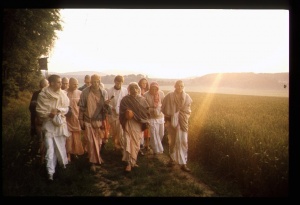CC Antya 1.146: Difference between revisions
No edit summary |
(Vanibot #0054 edit - transform synonyms into clickable links, which search similar occurrences) |
||
| Line 19: | Line 19: | ||
<div class="synonyms"> | <div class="synonyms"> | ||
''akārunyaḥ'' | ''[//vanipedia.org/wiki/Special:VaniSearch?s=akārunyaḥ&tab=syno_o&ds=1 akārunyaḥ]'' — very cruel; ''[//vanipedia.org/wiki/Special:VaniSearch?s=kṛṣṇaḥ&tab=syno_o&ds=1 kṛṣṇaḥ]'' — Lord Kṛṣṇa; ''[//vanipedia.org/wiki/Special:VaniSearch?s=yadi&tab=syno_o&ds=1 yadi]'' — if; ''[//vanipedia.org/wiki/Special:VaniSearch?s=mayi&tab=syno_o&ds=1 mayi]'' — unto Me; ''[//vanipedia.org/wiki/Special:VaniSearch?s=tava&tab=syno_o&ds=1 tava]'' — your; ''[//vanipedia.org/wiki/Special:VaniSearch?s=āgaḥ&tab=syno_o&ds=1 āgaḥ]'' — offense; ''[//vanipedia.org/wiki/Special:VaniSearch?s=katham&tab=syno_o&ds=1 katham]'' — how; ''[//vanipedia.org/wiki/Special:VaniSearch?s=idam&tab=syno_o&ds=1 idam]'' — this; ''[//vanipedia.org/wiki/Special:VaniSearch?s=mudhā&tab=syno_o&ds=1 mudhā]'' — uselessly; ''[//vanipedia.org/wiki/Special:VaniSearch?s=mā&tab=syno_o&ds=1 mā] [//vanipedia.org/wiki/Special:VaniSearch?s=rodīḥ&tab=syno_o&ds=1 rodīḥ]'' — do not cry; ''[//vanipedia.org/wiki/Special:VaniSearch?s=me&tab=syno_o&ds=1 me]'' — for Me; ''[//vanipedia.org/wiki/Special:VaniSearch?s=kuru&tab=syno_o&ds=1 kuru]'' — do; ''[//vanipedia.org/wiki/Special:VaniSearch?s=param&tab=syno_o&ds=1 param]'' — but afterwards; ''[//vanipedia.org/wiki/Special:VaniSearch?s=imām&tab=syno_o&ds=1 imām]'' — this; ''[//vanipedia.org/wiki/Special:VaniSearch?s=uttara&tab=syno_o&ds=1 uttara]-[//vanipedia.org/wiki/Special:VaniSearch?s=kṛtim&tab=syno_o&ds=1 kṛtim]'' — final act; ''[//vanipedia.org/wiki/Special:VaniSearch?s=tamālasya&tab=syno_o&ds=1 tamālasya]'' — of a ''tamāla'' tree; ''[//vanipedia.org/wiki/Special:VaniSearch?s=skandhe&tab=syno_o&ds=1 skandhe]'' — the trunk; ''[//vanipedia.org/wiki/Special:VaniSearch?s=vinihita&tab=syno_o&ds=1 vinihita]'' — fixed upon; ''[//vanipedia.org/wiki/Special:VaniSearch?s=bhuja&tab=syno_o&ds=1 bhuja]-[//vanipedia.org/wiki/Special:VaniSearch?s=vallariḥ&tab=syno_o&ds=1 vallariḥ]'' — arms like creepers; ''[//vanipedia.org/wiki/Special:VaniSearch?s=iyam&tab=syno_o&ds=1 iyam]'' — this; ''[//vanipedia.org/wiki/Special:VaniSearch?s=yathā&tab=syno_o&ds=1 yathā]'' — as far as possible; ''[//vanipedia.org/wiki/Special:VaniSearch?s=vṛndā&tab=syno_o&ds=1 vṛndā]-[//vanipedia.org/wiki/Special:VaniSearch?s=araṇye&tab=syno_o&ds=1 araṇye]'' — in the forest of Vṛndāvana; ''[//vanipedia.org/wiki/Special:VaniSearch?s=ciram&tab=syno_o&ds=1 ciram]'' — forever; ''[//vanipedia.org/wiki/Special:VaniSearch?s=avicalā&tab=syno_o&ds=1 avicalā]'' — without being disturbed; ''[//vanipedia.org/wiki/Special:VaniSearch?s=tiṣṭhati&tab=syno_o&ds=1 tiṣṭhati]'' — remains; ''[//vanipedia.org/wiki/Special:VaniSearch?s=tanuḥ&tab=syno_o&ds=1 tanuḥ]'' — the body. | ||
</div> | </div> | ||
Latest revision as of 19:25, 19 February 2024

A.C. Bhaktivedanta Swami Prabhupada
TEXT 146
- akāruṇyaḥ kṛṣṇo yadi mayi tavāgaḥ katham idaṁ
- mudhā mā rodīr me kuru param imām uttara-kṛtim
- tamālasya skandhe vinihita-bhuja-vallarir iyaṁ
- yathā vṛndāraṇye ciram avicalā tiṣṭhati tanuḥ
SYNONYMS
akārunyaḥ — very cruel; kṛṣṇaḥ — Lord Kṛṣṇa; yadi — if; mayi — unto Me; tava — your; āgaḥ — offense; katham — how; idam — this; mudhā — uselessly; mā rodīḥ — do not cry; me — for Me; kuru — do; param — but afterwards; imām — this; uttara-kṛtim — final act; tamālasya — of a tamāla tree; skandhe — the trunk; vinihita — fixed upon; bhuja-vallariḥ — arms like creepers; iyam — this; yathā — as far as possible; vṛndā-araṇye — in the forest of Vṛndāvana; ciram — forever; avicalā — without being disturbed; tiṣṭhati — remains; tanuḥ — the body.
TRANSLATION
"[Śrīmatī Rādhārāṇī said to Her constant companion Viśākhā:] 'My dear friend, if Kṛṣṇa is unkind to Me, there will be no need for you to cry, for it will not be due to any fault of yours. I shall then have to die, but afterwards please do one thing for Me: to observe My funeral ceremony, place My body with its arms embracing a tamāla tree like creepers so that I may remain forever in Vṛndāvana undisturbed. That is My last request.' "
PURPORT
This verse is Vidagdha-mādhava 2.47.